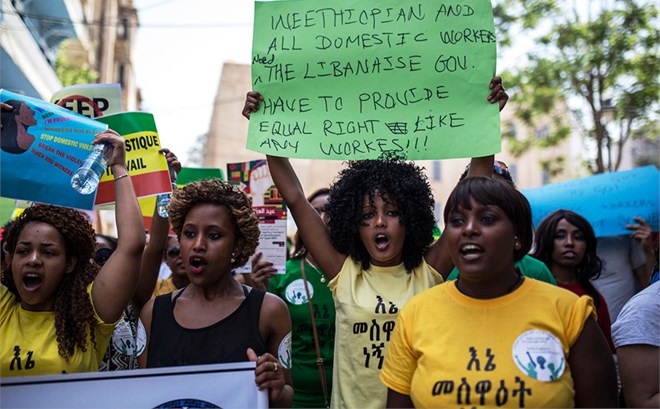
Friday February 2, 2018

Hundreds of migrant domestic workers march in the Lebanese capital Beirut in May 2016. The domestic workers (house-maids) called for basic rights, including a minimum wage and at least one day off per week. Anne Paq/Al Jazeera
Addis Ababa - Ethiopia has lifted a ban on domestic workers moving overseas after passing a new law to guard against ill-treatment, a government official said on Thursday.
Africa's second-most populous country instituted the ban five years ago following reports of abuse, and complaints that employment agencies lured Ethiopians into working abroad in illegal and appalling conditions.
Abebe Haile, a director at the labour ministry, said the new law regulates employment agencies that connect jobless Ethiopians with work in foreign countries.
The government has also opened training centres for low-skilled workers heading abroad.
Ethiopia is one of the continent's poorest countries and, according to the International Labour Organisation (ILO), a major source of migrants particularly to the Middle East, where there were around 460 000 Ethiopian workers in 2013 when the ban came into force.
At the time reports of worker abuse were rampant, including a video that emerged online showing an Ethiopian maid in Lebanon being dragged by her hair in public by her employers. She later killed herself in hospital.
While some Ethiopians work legally in the Middle East, others travel without visas despite having to cross through war-torn Yemen and risk a perilous boat trip across the Gulf of Aden.
Last week at least 30 people drowned when a boat carrying Somali and Ethiopian migrants capsized off Yemen's coast.
Saudi Arabia - a popular destination for Ethiopian migrants - has carried out mass deportations of illegal foreign workers that rights groups have decried for their brutality.
Riyadh last year announced it would begin deporting illegal migrants again and Ethiopia's foreign ministry told state media that more than 14,000 of its citizens have been repatriated since November.
Abebe said Ethiopia has signed bilateral agreements with Kuwait, Jordan and Qatar to govern the flow of low-skilled workers, and is working on agreements with other nations.